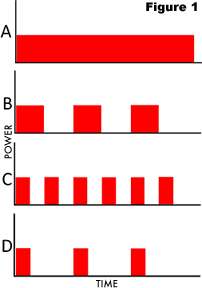
Pulsing in Laser Therapy: Possible Physiological Effects
Therapeutic laser technology and clinical applications are on the "front" of the wave. The use of pulsed and modulated frequencies versus CW to more specifically address certain conditions has a significant body of evidence, and more research will enhance the effectiveness of laser therapy treatments in the years to come.

Pulsing in Laser Therapy: Understanding different output modes
Therapeutic laser light can also be modulated, or flashed on and off many times per second. The mechanism of how the laser light is modulated inside the laser unit is a topic for another article. Here we are focusing on what the tissue "sees." Whether the light is turned on and off by flipping a switch or by passing a shutter in its path, the outcome is the same: laser light that is flashing.

Talking About Lasers: NAALT Conference Review
The purpose of NAALT is to be a forum for therapeutic light therapy practitioners in North America (Mexico, USA and Canada). It is our intention to promote phototherapy as a valid treatment, and to improve understanding of photobiological mechanisms, basic therapeutic light physics, safety, treatment parameters, techniques, regulatory issues and reimbursement.

Physics for Chiropractors: Can Laser Therapy Damage Tissue?
While exhibiting at a chiropractic trade show a couple years ago, a wily old doctor asked me, "How do you know you're not causing cancer?" which is an excellent question. Let's talk about laser and its effects on tissue.

Physics for Chiropractors: Laser Eye Safety for Class IV Therapy Lasers
To summarize, an increasing number of chiropractors are discovering Class IV therapy lasers to be an effective modality for pain management and injury healing. They have the ability to deliver a therapeutic dosage in less time, but also carry an increased risk of eye injury and must be used in a closed room with everyone wearing laser-specific eye protection.
“Class 4 Laser Therapy will be an integral modality worldwide in all fields of healthcare.”
— Dr. Phil Harrington, lecturing in Malaysia


